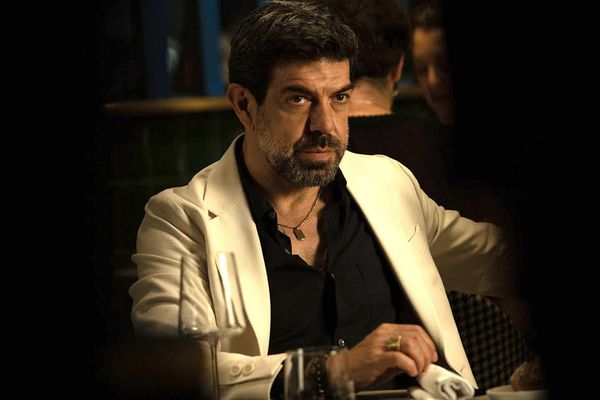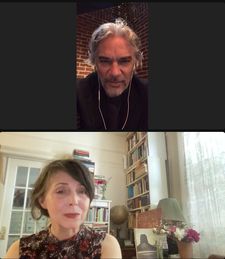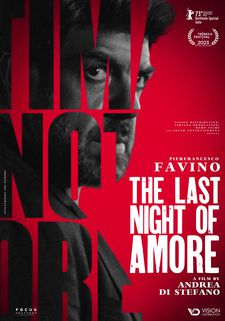 |
| The Last Night Of Amore director Andrea Di Stefano on Pierfrancesco Favino: “I wrote it thinking of him. I had his face in my mind.” |
The retirement party for police lieutenant Franco Amore (Pierfrancesco Favino of Marco Bellocchio’s The Traitor and Francesca Archibugi’s The Hummingbird) is in full swing, only the one person celebrated is nowhere to be seen in Andrea Di Stefano’s thriller The Last Night Of Amore (L'ultima Notte Di Amore, a highlight in the Viewpoints program of the 22nd edition of the Tribeca Film Festival). He arrives late, in jogging pants, having been out running through the nightly streets of Milan. Almost immediately after his arrival, he is called in to work because his partner Dino (Francesco Di Leva of Mario Martone’s Nostalgia with Favino) has been shot. Nothing is what it seems, we soon are about to find out, when the film jumps ten days back in time.
 |
| Andrea Di Stefano with Anne-Katrin Titze: “I’m trying to put together the financing for this script I wrote on Jan Karski, who’s a Polish hero of the Second World War.” |
Another party in a fancy penthouse and terrace overlooking the city, Amore and his wife Viviana (Linda Caridi) greet their Chinese host Bao Zhang (Mao Wen) with a tray of home cooked food. Viviana is given a bulky porcelain carp sculpture in return that symbolises good luck, which they will need. Zhang gives Amore credit for saving his life.
Amore has 35 years of honourable service to the police behind him, never having shot anybody. This remarkable feat makes him attractive in the eyes of some people who have a specific job in mind. The roof party is also attended by Cosimo (Antonio Gerardi), a cousin of Viviana’s, whose family background is a bit sketchy, criminally speaking, and who sometimes hires Amore as bodyguard to help out the family financially.
Now Franco is offered by Zhang a job to set up security services after his retirement. Cosimo does it already on a smaller scale. Dreams of being Robin Hood, criminal mind games, and what happens when you can never feel safe again, are only some of the concepts addressed in this nocturnal thriller of conscience, betrayal, and what the reality of police work means.
From the Roxy Cinema in New York, Andrea Di Stefano joined me on Zoom for an in-depth conversation on The Last Night Of Amore.
Anne-Katrin Titze: Hello!
Andrea Di Stefano: Ciao! Nice!
AKT: Ciao! Your film is really centred on one person, Franco Amore, who is played by Pierfrancesco Favino. Was it always clear that this was his part?
 |
| Franco Amore (Pierfrancesco Favino) with Dino (Francesco Di Leva) |
ADS: Yeah, I wrote it thinking of him. I had his face in my mind. I met him even before writing the script, telling him: “Beware, because I’m writing a script for you!” So we developed it almost from the first stage altogether.
AKT: You saw him as a policeman who is retiring and has a party and is jogging? The way you set up the beginning is interesting and quite messy.
ADS: It’s the party of his retirement. When I was doing the research the cops said they do a retirement party on the last nightshift and I thought that would be an interesting first scene for the movie. It’s a policeman but it’s not what you would expect from American movies. It’s someone who is kind and arrives at retirement without ever having shot anybody.
AKT: In 35 years on the job!
ADS: In 35 years. He’s very proud of that and it sets up a completely different character from what you’ll expect from these kind of movies. And I think Pierfrancesco is very good at portraying this character, so rich and touching. And I also like that he’s very recognisable; it could be someone that we know. I think he did a great job with this.
AKT: Definitely! At another party - you have quite a number of party scenes - on the rooftop in Milan, Bao Zhang gives Franco’s wife a big carp, which is very funny. There is almost an exchange. She brings a tray of food and then she has to carry this carp around. The objects and the ridiculousness of the situation are funny.
 |
| Andrea Di Stefano: “I always work with research I do and with what people say.” |
ADS: I received once a present like that. And just to carry it around was a whole thing. But I was always surprised how the Chinese community basically was very similar to Italian communities when they got to America in the beginning of the last century and even before. This wanting to be all together, spending Sundays together, a lot of food. I wanted to portray this community in a very joyful way. When we started doing research we came across these kind of reunions they have and we tried to reproduce it as best as we could.
AKT: And this carp also has a symbolic meaning we are being told about. That a carp becomes a dragon when it goes upstream!
ADS: There is one carp that is able to cross the waterfalls of the river and that carp becomes a dragon.
AKT: Did you search for that story? How did it enter the script?
ADS: Yeah, I searched a bit of the story. I was trying to understand what a person like that would say or do, like Bao Zhang in that situation. There was something very regal somehow about something this very old man told me in Milan that had to do with a carp becoming a dragon. And I though, wow, that’s interesting. Also I have to say the actor improvised a little bit in one scene during rehearsals. And when I looked back at the tape, I said that could be interesting in the film.
AKT: And you kept it! It’s interesting because he refers back to Amore as the “fishman.” Something we in the audience might think about is: what if this carp doesn’t want to be a dragon?
 |
| Franco (Pierfrancesco Favino) with his wife Viviana (Linda Caridi) |
ADS: Well, ha, I guess they’re going to find out! It’s really being put in this situation, surprisingly for him.
AKT: Another link to a classic story appears. What’s your connection to Robin Hood?
ADS: I take notes when people speak and one agent one day, kind of laughing, said: ”I want to be like Robin Hood! But I want to steal from the others to give to myself!”
AKT: Well, that’s not Robin Hood, that’s called stealing!
ADS: It was very funny, like a scream of desperation. He didn’t mean it, but it was funny how it came out. I often work, as you probably understand by now, I always work with research I do and with what people say. I try to get as much as possible reality back into the script.
AKT: Reality, but the diamonds also function as a MacGuffin, don’t they? Because ultimately it is about this one man and an environment that takes advantage of people who have honour? Is that one of the core themes?
ADS: The diamond is what’s happening. On the criminal level, it’s the new thing that’s happening right now, Chinese companies occupying Western Africa. What were the old blood diamonds, now it’s just diamonds, because they invade Europe very easily.
 |
| Andrea Di Stefano on Pierfrancesco Favino as Franco Amore: “I think Pierfrancesco is very good at portraying this character, so rich and touching.” |
AKT: I was not aware, so no MacGuffin at all?
ADS: To me the story is really about a human being who tries to do his best to arrive at the end of the month and he has to make ends meet. Police agents that are forced to do a double job, which most of the time could be a source of corruption, it’s a problem that’s very common in Italy, very common in France. The movie just came out in France and we had that reaction over there.
And it’s very common in England and Germany. The controversy that we have in Italy, the debate that started the film, I think is very healthy. I don’t think it’s a movie about someone who is pure and uncorrupted, I think it’s a movie of a man who has the ambition of being honest. The ambition doesn’t mean that he is honest.
AKT: Very true!
ADS: He really wanted to join the police corps because he wanted to fight on the right side but then after 35 years things change.
AKT: The ending is powerful. It works very well shadow-wise, I think. The casting choice, of course made me think of Bellocchio’s The Traitor, about a man who can never relax. There is never a moment when he is not aware that someone could come for him - that is also a shadow, isn’t it?
 |
| The Last Night Of Amore poster |
ADS: Yeah, I think when you start doing things that you don’t get 100% approval of by the criminal world, you always have to watch your back for the rest of your days. I wanted to leave an ending where you understand that this man has to do that for the rest of his days. His life will never be the same. That shadow can be anything. It can be anybody, just someone going to work, a tourist going back home from a discotheque, or it can be someone there who is going to be the last person he is going to see in his life.
AKT: Are you working on a new film?
ADS: Yes, I’m trying to put together the financing for this script I wrote on Jan Karski, who’s a Polish hero of the Second World War. Hopefully that’s going to happen soon. We’re going to send you all the details. The Karski Report was the first report on the Holocaust ever presented to the world on the 17th of December, 1942, at the League of Nations and the Holocaust was described as we know it today. It’s some kind of accusation to the western world of having done nothing, even though they knew so early. And nobody ever talks about that.
AKT: Are you planning to film in Poland?
ADS: Right now we are planning on filming in Northern Italy, Slovenia, Lithuania, maybe we are considering also Poland. But when you finance a film a lot depends on where you get the money.
AKT: Best of luck with this and thank you for this conversation.
ADS: Thank you very much, thanks a lot!





















